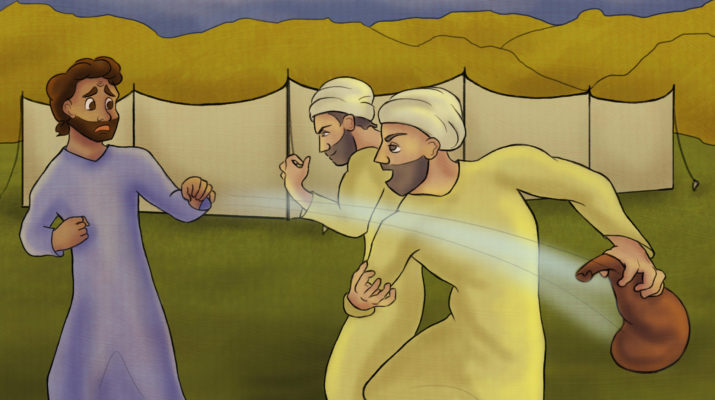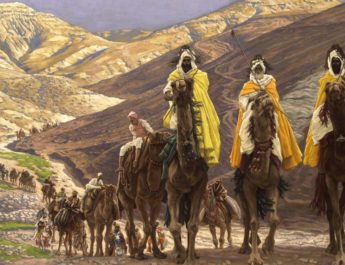1 Samuel 2:12-17, 22-25
A Women’s Lectionary 32
12 Now the sonsA of EliB wereC scoundrels;D they had no regardE for the LordF
A “sons” = ben. From banah (to build or obtain children). This is son, age, child. It is son in a literal or figurative sense.
B “Eli” = Eli. From alah (to go up, climb, approach, bring; to be high or actively climb; can be literal or figurative). This is Eli, meaning “lofty.”
C {untranslated} = ben. Same as “sons” in v12. See note A above.
D “scoundrels” = beliyyaal. From beli (lack, nothing, without, wearing out, failure, destruction); {from balah (to grow old, wear out, waste away, consume, spend)} + yaal (to gain, profit, do good, ascend, be useful or valuable; benefitted). This is lacking profit i.e. worthlessness, destruction, evil, ungodly person, wickedness, or Belial.
E “had…regard” = yada. This is to know, acknowledge, advise, answer, be aware, be acquainted with. Properly, this is to figure something out by seeing. It includes ideas of observation, recognition, and care about something. It can be used causatively for instruction, designation, and punishment.
F “Lord” = YHVH. From havah (to be, become) or hayah (to come to pass, become, be). This is the name of the God of Israel, the self-existent and eternal one, the tetragrammaton. This pronunciation has been lost to time so “Lord” is generally used in its place.
13 or for the dutiesG of the priestsH to the people.I
G “duties” = mishpat. From shaphat (to judge, defend, pronounce judgment, condemn, govern). This is a verdict or formal sentence whether from humans or from God. It includes the act of judging as well as the place that judging takes place, the suit itself, and the penalty. Abstractly, this is justice, which includes the rights of the participants.
H “priests” = kohen. This is literally the one who officiates i.e. the priest. This is where the Jewish last name “Cohen” (and its variants) comes from.
I “people” = am. From amam (to darken, hide, associate; creating shadows by huddling together). This is people or nation. It can be used specifically for a tribe, collectively of troops or armies, or figuratively to refer to a flock of animals.
When anyoneJ offeredK sacrifice,L the priest’s servantM would come,N
J “anyone” = kol + ish. Kol is from kalal (to complete). This is all or every. Ish is perhaps from enosh (human, humankind, mortal); from anash (to be weak, sick, or frail). This is man, husband, another, or humankind.
K “offered” = zabach. This is slaughtering an animal, generally for the purpose of sacrifice. It can mean kill or offer.
L “sacrifice” = zebach. Related to “offered” in v13. From zabach (see note K above). This is a slaughter – literally of an animal. So, it implies the act or the animals used in sacrifice. Further, it can mean offering.
M “servant” = naar. May be from na’ar (to shake, toss up and down, tumble around). This is a child or a servant. It is a child in their active years so they could be aged anywhere from infancy to adolescence.
N “come” = bo. This is to enter, come in, advance, fulfill, bring offerings, enter to worship, attack. It can also have a sexual connotation.
while the meatO was boiling,P with a three-prongedQ forkR in his hand,S
O “meat” = basar. From basar (being a messenger, publish, carry preach; properly, this is being fresh, rosy or cheerful as one bearing news). This is flesh, the body, fat, skin, self, nakedness, humankind, or kin. It can also refer to private parts.
P “boiling” = bashal. This is to boil up, roast, or bake. It can also mean ripen, produce, or seethe.
Q “three-pronged” = shalosh + shen. Shalosh is three, fork, three times. Shen is from shanan (to sharpen, point, pierce; figuratively to teach). This is a tooth, ivory, something sharp, or, figuratively, a cliff.
R “fork” = mazleg. 7x in OT – all related to the altar/Temple. Root may mean to draw up. This is fleshhook or fork – it is a utensil for sacrifices.
S “hand” = yad. This is hand, ability, power. Hand in a literal sense, but also what one can do or the means by which one does it.
14 and he would thrustT it into the pan,U kettle,V caldron,W or pot;X
T “thrust” = nakah. This is to hit whether lightly or severely. It can be used in a literal or figurative sense. So, this could be beat, punish, give wounds, kill, or slaughter.
U “pan” = kiyyor. From the same as kur (furnace, smelting pot). This is a firepot, basin, hearth, pulpit, scaffold.
V “kettle” = dud. 7x in OT. From the same as dod (beloved, love, uncle, love token; root may mean to boil). This is a pot or kettle used for boiling. It can also be a jar or basket.
W “caldron” = qallachath. 2x in OT. Perhaps from tsallachath (dish, bowl, bosom); from the same as tselachah (pot, pan, platter); perhaps from tsalach (pushing forward in a literal or figurative sense; to break out, to come mightily, to rush, to go over; figuratively, to prosper). This is a caldron or kettle.
X “pot” = parur. 3x in OT. From the same as purah (measure, wine press) OR from parar (to break, defeat, frustrate, caste off, clean, cease). This is a pot, pan, or skillet.
allY that the fork brought upZ the priest would takeAA for himself. This is what they didBB at ShilohCC to all the IsraelitesDD who came there.
Y “all” = kol. Same as “anyone” in v13. See note J above.
Z “brought up” = alah. Related to “Eli” in v12. See note B above.
AA “take” = laqach. This is to take, accept, carry away, receive. It can also have the sense of take a wife or take in marriage.
BB “did” = asah. This is to make, do, act, appoint, become in many senses.
CC “Shiloh” = Shiloh. From shalah (to draw out, take away, require) OR from the same as Shiyloh (Shiloh; perhaps “he whose it is” or “tranquil”); perhaps from shalah (to be quiet, safe, tranquil; can imply success or happiness; could also mean to deceive or be negligent). This is Shiloh, perhaps “he whose it is” or “tranquil.”
DD “Israelites” = Yisrael. From sarah (to persist, exert oneself, contend, persevere, wrestle, prevail) + el (God or god). This is Israel, meaning God strives or one who strives with God; new name for Jacob and for his offspring. This refers to the people and to the land.
15 Moreover, before the fatEE was burned,FF the priest’s servant would come and say to the oneGG who was sacrificing, “GiveHH meat for the priest to roast,II for he will not acceptJJ boiled meat from you but only raw.”KK
EE “fat” = cheleb. This is fat, finest, marrow. It is fat in a literal or figurative sense. It refers to the richest or best part.
FF “burned” = qatar. Perhaps from qetoreth (smoke, incense, the scent of the sacrifice as it burned); from the same as qitor (thick smoke, vapor). This is to make an offering, particular one of burned incense. It focuses on the fragrance made from the sacrificial fire. This is generally used to refer to worship.
GG “one” = ish. Same as “anyone” in v13. See note J above.
HH “give” = natan. This is to give, put, set, offer. It is to give literally or figuratively.
II “roast” = tsalah. 3x in OT. This is to roast meat.
JJ “accept” = laqach. Same as “take” in v14. See note AA above.
KK “raw” = chay. From chayah (to live or keep alive literally or figuratively). This is alive, living, lifetime. It can also be used to describe someone’s age. It can refer to animals, plants, water, or a company or congregation of people. It is life in a very broad sense.
16 And if the manLL said to him, “Let them burnMM the fat firstNN and then take whatever you wish,”OO he would say, “No, youPP must give it now; if not, I will take it by force.”QQ
LL “man” = ish. Same as “anyone” in v13. See note J above.
MM “burn” = qatar + qatar. Same as “burned” in v15. See note FF above. The word is repeated twice – the first time as an Infinitive Absolute. The Infinitive Absolute serves to emphasize the sentiment of the word. It is rather like Foghorn Leghorn’s speech pattern, “I said, I said.”
NN “first” = yom. Root may mean being hot. This is the day in a literal or figurative sense. It can also mean birth, age, daylight, continually or other references to time.
OO “wish” = taavah. From the same as avah (to desire, crave, wish for, lust after). This is what is desirable, a delight, greedy, satisfaction, a charm.
PP “you” = nephesh. Related to naphash (to refresh or be refreshed). This is soul, self, person, emotion. It is a breathing creature. Can also refer to appetites and desires.
QQ “force” = chozqah. 6x in OT. From chozeq (strength, power); from chazaq (to strengthen, seize, be courageous, repair, bind, heal, conquer, harden). This is strength, force, vigorously. It usually has a negative sense of vehemence.
17 Thus the sinRR of the young menSS wasTT veryUU greatVV
RR “sin” = chatta’ah. From chata’ (to miss or go wrong and so to sin, bear the blame; it can also include the sense of forfeiting or lacking). This is sin itself as well as punishment for sin. It is sometimes used specifically to refer to sin that is habitual.
SS “young men” = naar. Same as “servant” in v13. See note M above.
TT “was” = hayah. Related to “Lord” in v12. See note F above.
UU “very” = meod. Perhaps from the same as uwd (firebrand, a poker). This is very, greatly, exceedingly. It can also mean vehemence, force, abundance.
VV “great” = gadol. From gadal (to grow up, become great, become wealthy – to advance. The root meaning may be to twist in the sense of the process of growing). This is great, high, bigger, noble, old, marvelous. It can also refer to someone who is powerful or distinguished.
in the sight ofWW the Lord, for theyXX treated the offeringsYY of the Lord with contempt.ZZ
WW “in the sight of” = paneh. From panah (to turn, face, appear). This is face in a literal or figurative sense. It could be face, presence, anger, respect. It can also be used of God to indicate divine favor or presence.
XX “they” = enosh. Related to “anyone” in v13. See note J above.
YY “offerings” = minchah. This is a gift or an offering, particularly a sacrificial one that is generally bloodless and given spontaneously (voluntarily).
ZZ “treated…with contempt” = naats. This is to spurn, reject, provoke, abhor, treat with contempt. It can also mean bloom or flourish.
22 Now Eli was very old.AAA He heardBBB all that his sons were doing to all Israel and how they layCCC with the womenDDD
AAA “was…old” = zaqen. From the same as zaqan (beard or chin – the beard represents old age). This is to be old or grow old.
BBB “heard” = shama. This is to hear, call, consent, or consider. It implies listening intelligently, giving attention, and, because of these two factors, obedience and action are often implied.
CCC “lay” = shakab. This is to lie down, lodge. It is lying for sleep, sex, or other reasons.
DDD “women” = ishshah. Related to “anyone” in v13 & “they” in v17. From ish (see note J above). This is woman, wife, or female.
who servedEEE at the entranceFFF to the tentGGG of meeting.HHH
EEE “served” = tsaba. 14x in OT. This is to wage war, serve, assemble, fight, perform, muster, wait on.
FFF “entrance” = petach. From pathach (to open wide in a literal or figurative sense; to open, draw out, let something go free, break forth, to plow, engrave, or carve). This is any kind of opening – a door, entrance, gate.
GGG “tent” = ohel. Perhaps from ahal (to shine, be clear). This is a tent, covering, home, or side pillar.
HHH “meeting” = moed. From yaad (to appoint, assemble or gather selves, agree). This is a meeting, assembly, fixed time. It can be used for a festival or feast. It can also refer to a meeting place.
23 He said to them, “Why do you do such things?III For I hear of your evilJJJ dealingsKKK from all these people.
III “things” = dabar. From dabar (to speak, declare, discuss). This is speech, a word, a matter, an affair, charge, command, message, promise, purpose, report, request. It is a word, which implies things that are spoken of in a wide sense.
JJJ “evil” = ra’. From ra’a’ (to be evil, bad, afflict; properly, to spoil – to destroy by breaking into pieces; figuratively, to cause something to be worthless; this is bad in a physical, social, or moral sense; that which displeases, to do harm or mischief, to punish or vex). This is bad, disagreeable, that which causes pain, misery, something having little or no value, something that is ethically bad, wicked, injury, calamity. This refers to anything that is not what it ought to be – a natural disaster, a disfigurement, an injury, a sin.
KKK “dealings” = dabar. Same as “things” in v23. See note III above.
24 No, my sons; it is not a goodLLL reportMMM that I hear the people of the Lord spreading abroad.NNN
LLL “good” = tob. From tob (to be pleasing, to be good). This is good, beautiful, pleasant, agreeable, bountiful, at ease. This word is used for goodness as a concept, a good thing, a good person. This can refer to prosperity and welfare as well as joy, kindness, sweetness, and graciousness. So, this is ethically good, but also enjoyably good.
MMM “report” = shemuah. Related to “heard” in v22. From shama (see note BBB above). This is something heard – news, a rumor, fame, announcement.
NNN “spreading abroad” = abar. This is to pass over or cross over. It is used for transitions, whether literal or figurative. It can also mean to escape, alienate, or fail. This is the root verb from which “Hebrew” is drawn.
25 If one person sinsOOO against another,PPP someoneQQQ can intercedeRRR for the sinner with the Lord,SSS but if someone sins against the Lord,TTT who can make intercession?”
OOO “sins” = chata. Related to “sin” in v17. See note RR above.
PPP “another” = ish. Same as “anyone” in v13. See note J above.
QQQ “someone” = ish. Same as “anyone” in v13. See note J above.
RRR “intercede” = palal. This is to judge for oneself or in an official capacity. It can also mean to pray or make supplication, to entreat.
SSS “Lord” = Elohim. Related to “Israelites” in v14. See note DD above.
TTT “Lord” = YHVH. Same as “Lord” in v12. See note F above.
But they would not listenUUU to the voiceVVV of their father,WWW for it was the willXXX of the LordYYY to killZZZ them.
UUU “listen” = shama. Same as “heard” in v22. See note BBB above.
VVV “voice” = qol. This is a sound, used often for human voices. Also used when God speaks or angels, animals or instruments. It can be a cry or a noise, thunder or earthquakes and so on.
WWW “father” = ab. This is father, chief, or ancestor. It is father in a literal or figurative sense.
XXX “was the will” = chaphets. Properly, this means inclined towards or bending to. Figuratively, it means to desire, delight in, or be pleased with.
YYY “Lord” = YHVH. Same as “Lord” in v12. See note F above.
ZZZ “kill” = mut. This is to die in a literal or figurative sense. It can also refer to being a dead body.
Image credit: “Samuel Worships God” by Amy & Carly of Fishnet Bible Stories.




